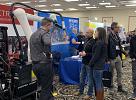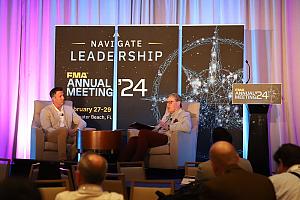- FMA
- The Fabricator
- FABTECH
- Canadian Metalworking
US manufacturing comeback? Obama faces high hurdles
President Barack Obama is making a strong election-year push for an economic revival “built on American manufacturing.” But he faces an uphill slog, with little consensus even within his own party on how to do it.
- February 10, 2012
- News Release
- Metalworking
WASHINGTON: President Barack Obama is making a strong election-year push for an economic revival “built on American manufacturing.” But he faces an uphill slog, with little consensus even within his own party on how to do it.
For decades, the US has gradually shifted from creating goods to providing services. Fifty years ago, a third of US jobs were in manufacturing. Now they account for just 9%, according to the Bureau of Labor Statistics. A manufacturing renaissance is being preached both from the White House, on the Republican campaign trail and in TV commercials.
Economists suggest plans to help boost manufacturing jobs may make more political sense than economic sense.
Obama's prescription for a manufacturing comeback will be fleshed out in the new budget he submits on Feb. 13. He is proposing tax incentives to companies that move their overseas operations back to the US, along with tax penalties for those that don't, more training and additional education.
But few of his ideas are likely to be enacted in this highly charged election year.
Since the recession officially ended nearly 2 1/2 years ago, manufacturing production has increased 15%, helped by the replacement of aging equipment and software and strong demand from foreign markets. But Federal Reserve Chairman Ben Bernanke told Congress this week that the rebound might not last: “More recently, the pace of growth in business investment has slowed, likely reflecting concerns about both the domestic outlook and developments in Europe.”
There are political overtones to Obama’s State of the Union appeal for “an economy that's built to last, an economy built on American manufacturing.” Polls show support for the president has slipped in industrial battleground states he won in 2008.
Helping manufacturers recover is also being talked up by Republican presidential contenders, who all blame Obama's policies for contributing to the decline.
Former Sen. Rick Santorum wants to eliminate the US corporate tax completely for manufacturers, saying it would help put “men and women in this country who built this country back to work.” Mitt Romney's get-tough rhetoric on China appears to be winning attention from workers and former workers in industries that have lost jobs to China. The former Massachusetts governor promises “to make America a more attractive place for manufacturers to invest.” Former House of Representatives Speaker Newt Gingrich says we “badly need to rebuild our manufacturing base,” promoting job creation in the defence, energy and space industries.
This heavy attention on manufacturing may be misplaced, economists suggest.
“The vast majority of jobs in the future are going to be created in the service sector, not the manufacturing sector,” said Nigel Gault, chief US economist for the consulting firm IHS Global Insight. He said he thought it was “a bit misleading” to focus so much on manufacturing.
“I'm not sure why manufacturing rather than any other industry warrants tax incentives,” Gault added.
Obama's sharp focus on reviving manufacturing isn't shared by all Democrats.
“Let's not fool ourselves. We're not going to have the kind of manufacturing-based economy we had 30 or 40 years ago,'' says Robert Reich, labour secretary under President Bill Clinton. And Christina Romer, who headed the president's Council of Economic Advisers from 2009-2010, says it is wrong to suggest that producing “real things” is more important than “services.”
Despite the job losses, the US remains an exporting powerhouse, right behind No. 1 China and vying with Germany for the No. 2 rank. U.S. factories have steadily become more advanced and automated, requiring only a fraction of the workers previously needed.
Yet, China is beginning to take some market share from the US in exporting advanced products and equipment, said a report by the US Business and Industry Council, which represents mainly family-owned companies.
subscribe now


Keep up to date with the latest news, events, and technology for all things metal from our pair of monthly magazines written specifically for Canadian manufacturers!
Start Your Free Subscription- Trending Articles
Modest manufacturing growth appears likely

There’s no business like show business

Tighitco, DCM Group Aerospace join forces on Airbus A220 program

Software automatically identifies vulnerable production assets

NAIT names Sandvik Coromant the 2024 Distinguished Industry Partner

- Industry Events
MME Saskatoon
- May 28, 2024
- Saskatoon, SK Canada
CME's Health & Safety Symposium for Manufacturers
- May 29, 2024
- Mississauga, ON Canada
DiPaolo Machine Tools Open House 2024
- June 4 - 5, 2024
- Mississauga, ON Canada
FABTECH Canada
- June 11 - 13, 2024
- Toronto, ON Canada
Zoller Open House & Technology Days 2024
- June 12 - 13, 2024
- Ann Arbor, MI














